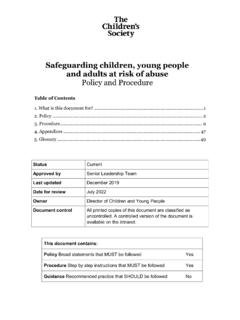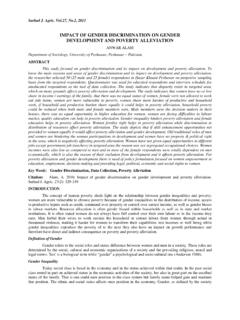Transcription of The impact of COVID-19 on children and young people
1 The impact of COVID-19 on children and young people Introduction The coronavirus pandemic has disrupted the life of every child in the country. It is not only an unprecedented public health emergency, but also a challenge our society and our economy have not seen in peacetime. The children 's Society welcome the coming together of politicians, professionals and communities to do everything it takes to respond to this crisis. The measures announced by the Treasury last week, to protect jobs and those facing financial insecurity through the course of the pandemic, are also a major step in the right direction. However, we know that there is much more to be done in coming weeks and months to: Protect children and families facing financial insecurity as a result of the crisis and to prevent child poverty reaching a record high especially through ensuring that social security payments increase if earnings fall, that there is emergency financial support available for those who need and to guarantee that no child is left without a safety net.
2 Respond to every child including those excluded from mainstream systems of support on account of their immigration status. Keep children and young people safe, whether they are continuing to attend school or staying at home particularly for those at risk of abuse or neglect and those with special educational needs Support the mental health and wellbeing of all children through the crisis particularly in the context of school closures and pressure on health services. There is no denying that the Government and other decision makers at every level - face a colossal challenge. We recognise the efforts that have been made in some of the areas identified above, and in its huge public health mobilisation. This briefing outlines our key concerns and recommendations around the impact of covid - 19 on children in poverty , refugee and migrant children , young people at risk, and around children 's mental health and wellbeing.
3 We hope it can make a small contribution to decisions which will need to be made in the near future, to help ensure the impact of this pandemic on children - and particularly those in the most vulnerable situations- is minimised. The children 's Society is a leading national charity committed to improving the lives of thousands of children and young people every year. We work across the country with some of the most disadvantaged children and young people through our specialist services. We place their voices at the centre of the work that we do. We continue to do all we can to support the collective effort to face the COVID-19 . crisis, and to ensure the social and economic effects of the coronavirus are not felt in the lives of our children in the years ahead. 1. children in poverty Whilst impacting on every child in the country, COVID-19 is likely to have a particularly pernicious impact on the estimated four million children and young people already living in poverty in the UK.
4 Furthermore, we estimate that million children aged 10-17 are living in a household with problem debt and an estimated million children of the same age are living in a household where there has been difficulty paying the bills. Financial instability will rise during the COVID-19 crisis and low-income families already unable to budget for unexpected expenses will be hit the hardest. This short briefing focuses on the likely impact of COVID-19 on young people facing poverty or destitution. The UK government has implemented measures to tackle this serious public health crisis, including closing schools (except for children of key workers and the most vulnerable children who have social workers) and enforcing social distancing, including working from home where possible. These measures are understandable and necessary in the given context. However, it is important to recognise the impact they are likely to have on children and young people , particularly those in low-income families or living in poverty .
5 School closures, while an important way to stave the spread of COVID-19 , could result in increased social isolation for young people . Although many schools are providing online learning, children whose families cannot afford access to laptops, phones or adequate internet or phone connections are likely to miss out on vital learning. For children who cannot access any such e-learning that schools are providing, there is also an added risk of stigma or shame. Costs of living will increase for families as more children are at home, while earnings for parents are likely to decrease, meaning families will struggle with the cost of food and other essentials. Increased childcare responsibilities for parents while children are not in school, and without the possibility of help from family networks (such as grandparents), are also likely to put additional financial strain on families. The outbreak of COVID-19 will continue to impact family finances, both in reducing income for many (such as parents on zero-hours contracts, with little job security or who work in particularly affected industries such as hospitality) and increased costs (of additional childcare, higher food and utility bills caused by family being at home more).
6 To minimise the impact of COVID-19 on these children and young people , we recommend government undertakes changes to the following areas: School closures and free school meals School closures mean that children can no longer receive Free School Meals, which are worth around 400 per year per child. Although the Government's proposed roll-out of a national voucher scheme for those who rely on free school meals is welcome, it will be crucial for Government in the coming days to clarify the mechanism through which this will be implemented. The Government should ensure Free School Meal vouchers are easily attainable, without a significant time lag, and valid for exchange in a range of accessible shops or food outlets. These should be available to all school children , regardless of their family's immigration status. Families with children not receiving Free School Meals are also likely to struggle with the cost of food, especially given predicted losses of income during the COVID-19 outbreak and overall increase in cost of living as children are at home.
7 This is likely to lead to an increase in families using foodbanks, similar to rises in the school holidays. However, supermarket shortages and panic buying during the COVID-19 outbreak have put additional pressures on foodbanks. Precautions around social distancing will also mean reduced staffing and access to foodbanks. As such, many families will desperately need alternative means to make ends meet. A temporary uplift in Child Benefit Payments for all parents of 10 per child per week would help these families during this period of financial uncertainty. Universal Credit The 1000 uplift in the Universal Credit standard allowance announced on 20 March is very welcome and will provide around 20 per week extra support for working and non-working families alike. However, issues remain around lag-times in transitioning onto the system and receiving initial payment. Universal Credit should support families instead of pushing them towards a financial crisis, especially during the COVID-19 pandemic when families may be losing income from employment.
8 The five-week wait for an initial Universal Credit payment can leave families without enough money to pay bills or to provide food for their children , pushing them into financial difficulty. Removing or at least temporarily suspending the five-week wait for the initial payment during the COVID-19 outbreak would allow Universal Credit to provide an effective safety net for families. This should be done by making advance payments as non- repayable grants, rather than as loans. Tax Credits While changes to Universal Credit are important, government needs to protect families still receiving tax credits as two thirds of families are not on Universal Credit, but on Tax Credits. Whilst it is welcome that the Government have announced 1000 increase in Working Tax Credit, unlike the increase in the standard allowance for Universal Credit, this support will not reach non working families. The Government should introduce a parallel increase in the child element of Child Tax Credit.
9 Furthermore, the Government urgently needs to suspend the Tax Credit income disregard for reductions in earnings at least for the financial year 2020-21, to ensure that where earnings fall, households' Tax Credit entitlement takes full account of this loss. Since 2012, the first 2,500 of a household's earnings reductions in the current financial year (compared to the previous financial year) are ignored for Tax Credit purposes. This means that when a worker sees their earnings fall so that they earn 2,500 less than they did the previous financial year, the earnings figure used to calculate their Tax Credit entitlement is not adjusted down to take account of this. Instead, they are treated as if their earnings are the same as the previous year, which would typically cost them more than 1,000 over the course of a year in which they are likely to be financially struggling. This is particularly problematic in the context of the COVID-19 pandemic, where considerable numbers of workers may be expected to see earnings reductions in excess of 2,500 over the course of the year as a result of sickness or the need to provide care.
10 Although the additional 1000 in Working Tax Credit announced on 20 March is welcome and will in part make up the income loss for working families described above, it will not provide a further needed supplement. Hardship fund We welcome the 500 million package of support the Treasury has announced for local authorities to protect the most vulnerable during the COVID-19 outbreak. Guidance on this prioritises the provision of additional support with Council Tax for those on a low income. Whilst important, we believe that the support offered through this fund should extend beyond help with Council Tax, and in particular, help to meet the emergency financial support needs of households facing crisis. Using existing infrastructure of Local Welfare Assistance Schemes would be an effective way to make payments to families facing financial crisis during this period. Local authorities without Local Welfare Assistance Schemes should be supported with the guidance they need to put in place structures to reach such families or partner with other Local Authorities to share best practice or operational capacity.










